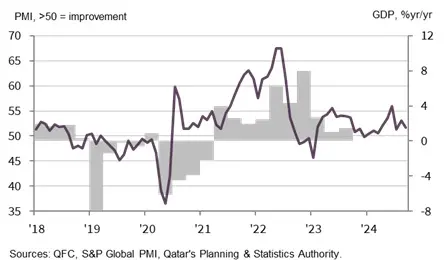PHOTO
- Strongest demand for financial services for over two years
- Sharpest increase in employment since the survey began in 2017
- Record wage growth drives overall cost pressures to the highest in over four years
Doha, Qatar – The latest Purchasing Managers’ Index™ (PMI®) survey data from Qatar Financial Centre (QFC) compiled by S&P Global signalled a sustained growth in business conditions in Qatar's non-energy private sector in September. The 12-month outlook for activity strengthened to the highest since March 2023 as demand for goods and services continued to increase, leading to a build-up in outstanding business. Companies boosted capacity by increasing employment at a survey-record rate. In tandem, wage inflation also reached a record high. Overall cost pressures were the highest in over four years, but charges for goods and services fell sharply.
The Qatar PMI indices are compiled from survey responses from a panel of around 450 private sector companies. The panel covers the manufacturing, construction, wholesale, retail, and services sectors, and reflects the structure of the non-energy economy according to official national accounts data.
The headline Qatar Financial Centre PMI is a composite single-figure indicator of non-energy private sector performance. It is derived from indicators for new orders, output, employment, suppliers’ delivery times and stocks of purchases.
The PMI eased to 51.7 in September, from 53.1 in August, signalling a sustained overall growth in business conditions in the non-energy private sector economy. It was slightly below the long-run trend level of 52.3 (since April 2017).
The employment component again provided the largest positive contribution to the headline figure in September. The non-energy private sector workforce expanded at the fastest rate on record, easily surpassing the previous peak set in January 2019.
Efforts to boost staff numbers partly reflected a build-up of outstanding business for the first time in eight months and at the fastest rate since mid-2022 in the lead-up to the football World Cup. This occurred as new business expanded for the ninth month running in September, but total business activity softened. Sub-sector data revealed that the pause in output growth purely reflected the construction sector, as activity rose in the manufacturing, services and wholesale & retail sectors.
The rate of increase in new business moderated in September, but confidence regarding the next 12 months strengthened again to the highest since March 2023. Positive sentiment among Qatari firms was attributed to economic development, a rising population and investment in key sectors including construction, real estate and tourism.
Rising demand for staff drove up wage pressures in the non-energy sector. The seasonally adjusted Staff Costs Index rose to a new high of 59.4. Non-staff cost pressures also intensified in September, with purchase price inflation the fastest in over four years. Overall input price inflation was the highest since July 2020. In contrast, prices charged for goods and services fell at the fastest rate since February 2019, linked to high competition.
Although new business rose and the outlook improved, purchasing activity softened slightly as firms reported broadly stable inventory holdings. This easing of pressure on supply chains was reflected in another reduction in average input lead times.
QFC Qatar PMI vs. GDP


Financial Services
Strongest demand for financial services for over two years
- New business increased at the fastest rate since July 2022
- Rate of employment growth among strongest in series history
- Sharp improvement in year-ahead outlook
There was a further acceleration in the growth of demand for Qatari financial services in September. The seasonally adjusted Financial Services New Business Index rose to 64.1, from 62.8 in August, signalling a rapid improvement in demand conditions with the fastest growth since August 2022. Growth of total activity was maintained (53.2).
Companies were also increasingly optimistic regarding the 12-month outlook, with sentiment at the highest level since February 2023 (78.1). There was also a notable boost to employment growth, which was the strongest in over five years and among the best on record (61.8).
In terms of prices, average charges set by financial services companies fell at the fastest rate in the series' history. Meanwhile, average input prices rose the most since July 2020.
Comment
Yousuf Mohamed Al-Jaida, Chief Executive Officer, QFC Authority:
“Although the headline PMI eased in September, on the whole, the latest survey results show a number of positive developments for the Qatari non-energy economy. The pause in the overall growth of output wholly reflected the construction sector, with growth sustained in manufacturing, services, finance, wholesale and retail. There was a series-record increase in employment during the month as firms sought to expand capacity to address rising backlogs.
"Qatar’s financial services recorded strong growth in September, the fastest growth since August 2022, showing rapid improvement in demand conditions. The 12-month outlook continued to brighten, as firms mentioned investment in key sectors such as construction, real estate and tourism. September data also showed a record increase in wages, which should boost consumer demand."
-Ends-
ABOUT THE QATAR FINANCIAL CENTRE
The Qatar Financial Centre (QFC) is an onshore business and financial centre located in Doha, providing an excellent platform for firms to do business in Qatar and the region. The QFC offers its own legal, regulatory, tax and business environment, which allows up to 100% foreign ownership, 100% repatriation of profits, and charges a competitive rate of 10% corporate tax on locally sourced profits.
The QFC welcomes a broad range of financial and non-financial services firms.
For more information about the permitted activities and the benefits of setting up in the QFC, please visit qfc.qa
@QFCAuthority | #QFCMeansBusiness@QFCAuthority | #QFCMeansBusiness
MEDIA CONTACTS
QFC: Rasha Kamaleddine, Marketing & Corporate Communications Department, r.kamaleddine@qfc.qa
ENQUIRIES ABOUT THE REPORT
QFC: qatarpmi@qfc.qa
ABOUT S&P GLOBAL
S&P Global (NYSE: SPGI) S&P Global provides essential intelligence. We enable governments, businesses and individuals with the right data, expertise, and connected technology so that they can make decisions with conviction. From helping our customers assess new investments to guiding them through ESG and energy transition across supply chains, we unlock new opportunities, solve challenges, and accelerate progress for the world.
We are widely sought after by many of the world’s leading organizations to provide credit ratings, benchmarks, analytics and workflow solutions in the global capital, commodity, and automotive markets. With every one of our offerings, we help the world’s leading organizations plan for tomorrow, today. www.spglobal.com.
ABOUT PMI
Purchasing Managers’ Index™ (PMI®) surveys are now available for over 40 countries and for key regions including the Eurozone. They are the most closely watched business surveys in the world, favoured by central banks, financial markets and business decision makers for their ability to provide up-to-date, accurate and often unique monthly indicators of economic trends.
www.spglobal.com/marketintelligence/en/mi/products/pmi.html
METHODOLOGY
The Qatar Financial Centre PMI® is compiled by S&P Global from responses to questionnaires sent to purchasing managers in a panel of around 450 private sector companies. The panel is stratified by detailed sector and company workforce size, based on contributions to GDP. The sectors covered by the survey include manufacturing, construction, wholesale, retail, and services.
Survey responses are collected in the second half of each month and indicate the direction of change compared to the previous month. A diffusion index is calculated for each survey variable. The index is the sum of the percentage of ‘higher’ responses and half the percentage of ‘unchanged’ responses. The indices vary between 0 and 100, with a reading above 50 indicating an overall increase compared to the previous month, and below 50 an overall decrease. The indices are then seasonally adjusted.
The headline figure is the Purchasing Managers’ Index™ (PMI). The PMI is a weighted average of the following five indices: New Orders (30%), Output (25%), Employment (20%), Suppliers’ Delivery Times (15%) and Stocks of Purchases (10%). For the PMI calculation the Suppliers’ Delivery Times Index is inverted so that it moves in a comparable direction to the other indices.
Underlying survey data are not revised after publication, but seasonal adjustment factors may be revised from time to time as appropriate which will affect the seasonally adjusted data series.
Data were collected 12-23 September 2024.
For further information on the PMI survey methodology, please contact economics@spglobal.com.
CONTACT
S&P Global: Sabrina Mayeen | E. Sabrina.mayeen@spglobal.com




















